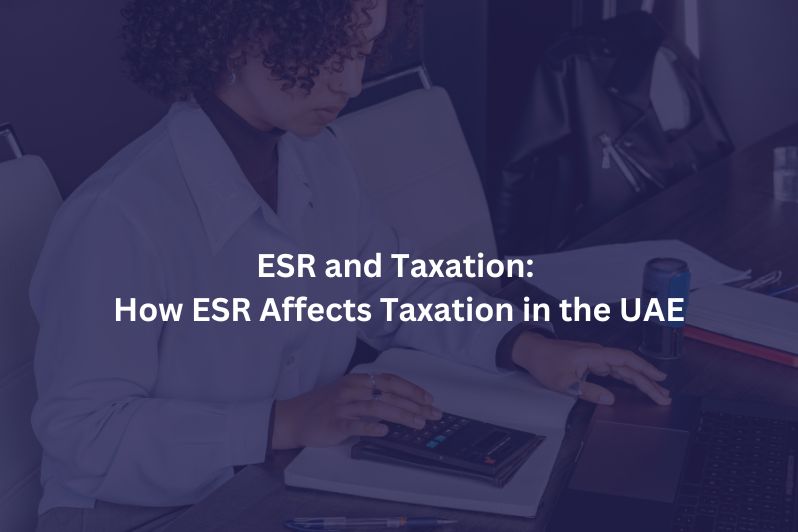The Economic Substance Regulations has an essential taxation framework that aligns with global tax standards set by the OECD and the EU Code of Conduct on Business Taxation. ESR require business to carry out economic activity within the UAE and ensure substantial economic presence within the jurisdictions where they operate. Compliance with ESR demonstrates the business’s commitment to promoting transparency and combating tax evasion. Thus, it is advisable for businesses to seek the expert services of trusted ESR Consultants in the UAE to ensure compliance with the Economic Substance Regulations effectively.
Key Aspects of ESR in the UAE
- Relevant Activities: The Economic Substance Regulations requires business to carry out any of the following defined Relevant Activities:
- Banking Business
- Insurance Business
- Investment Fund Management Business
- Lease – Finance Business
- Headquarters Business
- Shipping Business
- Holding Company Business
- Intellectual property Business (“IP”)
- Distribution and Service Center Business
- Economic Presence in the State: Businesses that carry out any of the above-mentioned relevant activities in the UAE are required to demonstrate an adequate level of economic presence within the UAE, which requires the business to conduct necessary Core Income Generating Activities (CIGAs) in the UAE, direct and manage their business in UAE and to demonstrate an adequate level of relevant activity carried out by them.
- Core Income-Generating Activities: Businesses carrying out the relevant activity have to conduct Core Income-Generating Activities in the UAE in relation to their activity. The Core Income-Generating Activities generate the gross income, therefore, the business should specify it as per ESR requirements.
- Directed and Managed in the UAE: Economic Substance Regulations require businesses to demonstrate an adequate number of board meetings that are held and attended in the UAE depending on their level of relevant activity.
- Level of Relevant Activity: Under Economic Substance Regulations, business needs to demonstrate the level of relevant activity which includes:
- A sufficient number of qualified full-time employees are present in the UAE.
- Sufficient operating expenditure in the UAE.
- Sufficient physical assets in the UAE.
Impact of ESR on Taxation in the UAE
- Increased Taxation Transparency:
The Economic Substance Regulations increase taxation transparency by requiring businesses carrying out the relevant activities to provide detailed and accurate information about their relevant income. By doing so, ESR ensures accountability of the taxable income and demonstrates that the businesses are paying their fair share of taxes. This increased taxation transparency aligns with the standardized international tax rules; thus, preventing tax avoidance.
- Assessment of Substance:
The taxable income of the businesses depends upon the value created and the profits being generated from the economic activities performed by them in relation to their relevant activities. Compliance with Economic Substance Regulations encourages businesses to demonstrate the presence of genuine economic substance within the UAE. Due to this fact both the local economy and businesses contribute meaningfully to the UAE’s growth and development.
- Impact on Multinational Companies
The introduction of Economic Substance Regulations brought a paradigm shift for multinational companies operating in the UAE. ESR is required to demonstrate a substantial economic presence in the UAE and curb tax evasion and profit shifting. Multinational corporations that were once legally avoiding income tax are now subjected to administrative penalties for their noncompliance with ESR.
- Implications for Foreign Direct Investment
Economic Substance Regulations had implications for foreign companies who want to establish their businesses in the UAE in regards to foreign direct investment (FDI) in the UAE. Under Economic Substance Regulations foreign businesses need to carefully evaluate the economic activities carried out in the UAE and potential tax implications in relation to their relevant activities. However, the implication of foreign direct investment enhanced the UAE’s reputation in the global business landscape by ensuring a more transparent and stable business environment in the UAE.
- Impact on Tax Residency
Businesses operating in the UAE are required to meet the set criteria as specified in the Economic Substance Regulations which can influence their tax residency status. It is essential for businesses to provide accurate documents to verify their status as exempted licensee to avoid paying extra taxes, moreover, it may affect their overall tax position.
- Potential for Double Taxation Relief
The Economic Substance Regulations complies with the International Tax Rules which ensures that businesses are prevented from double taxation. The businesses are required to have substantial economic substance in the UAE as per the regulations which ensures the clarity for taxation in accordance with the business’s jurisdiction. Due to this fact, the companies are safe from taxation in multiple jurisdictions for the same income, providing detailed information about their relevant activities and reducing the risk of financial burden.
- Avoidance of Penalties
Failure to meet the requirements of the Economic Substance Regulations can result in significant penalties, which can range from monetary fines to more severe consequences like suspension, which involves being listed as a non-cooperative jurisdiction for tax purposes within the UAE.
Seek the expert services of ESR Consultants in UAE
In order to understand the requirements of the Economic Substance Regulations and taxation status, it is advised that businesses operating within the UAE should seek the services of expert ESR consultants in the UAE, to ensure compliance with ESR and taxation and to avoid penalties. Thus, contact us today and we shall be glad to assist you.

